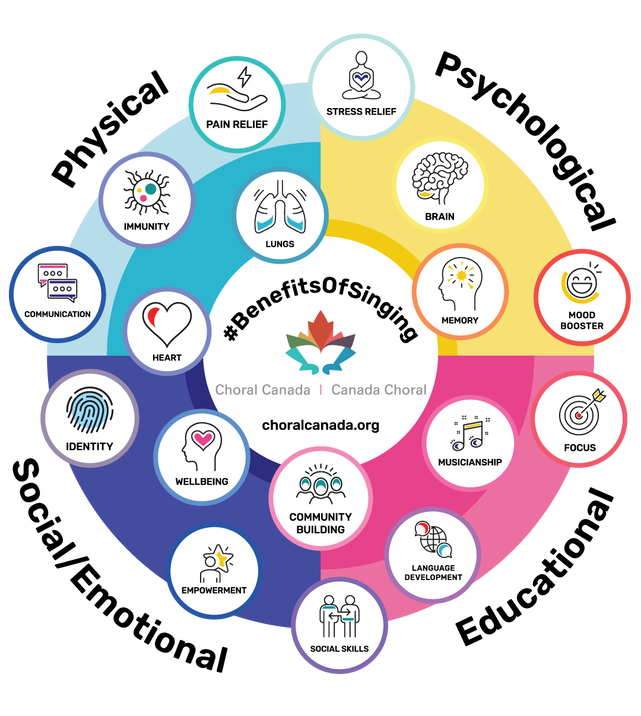
April 2022 marked an important milestone for The SingWell Project as our Executive Committee selected the first group of research study proposals that will receive funding from SingWell. The SingWell Executive Committee is comprised of 12 members, each of whom are one of our research or community partners. Each committee member brings their own professional or personal experiences from their field of expertise that allowed each proposal to be thoroughly evaluated. The Executive Committee proposal review followed an initial evaluation of the submissions by our six Theme Leaders, who are also SingWell research partners and are subject matter experts in SingWell’s five target communication challenge populations.
Five unique studies were selected from the group of submissions we received during our call for proposals earlier this year. Applicants were faced with the challenge of not only presenting a sound study proposal, but also consider what a contingency plan would look like if COVID-19 public health restrictions prevents them from executing their original vision. We are pleased to share this year’s recipients, who are expected to begin their studies in late 2022 and early 2023.
ChantWell: Assessing the benefits of chanting for breathing disorders
Researchers: Gemma Perry and Dr. Bill Thompson, Macquarie University (Australia)
Breathing disorders lead to psychological (anxiety, depression), physiological (posture, nervous system dysfunction), and communication problems (voice production), and may result in social isolation and loneliness. This project will assess the benefits of a 12-week online chanting program for individuals with breathing disorders.
Group chanting is a repetitive, rhythmic vocalization that requires controlled breathing and vocal synchronization with co-participants. It is a ubiquitous practice found in many traditions worldwide and is used to strengthen communities and nurture health and wellbeing.
Our research has already demonstrated that group chanting can reduce stress, increase social connectedness, and induce altered states of consciousness and feelings of wellbeing. This investigation will assess these outcomes, while also evaluating therapeutic benefits for breathing and communication function. The research will lead to an understanding of the therapeutic potential of group chanting, and the development of new chanting programs designed to help individuals with breathing and communication disorders.
Effects of an online group-singing program for older adults with breathing disorders on lung health, functional capacity, cognition, quality of life, communication skills, and social inclusion
Researchers: Drs. Louise Drouin and Nicole Marquis, Université de Sherbrooke (Canada)
Using a mixed-method non-inferiority design, with a non-probability convenience sampling, we propose a group singing online program as a complement or alternative to online pulmonary rehabilitation (OPR), for older adults with respiratory disease. Due to restrictions on social gatherings as a result of the pandemic, as well as geographic and weather conditions limiting the mobility of people affected by airflow limitation, our study aims to improve the wellbeing of potential participants. This 12-week study is based on our recent pilot comparing the effects of pulmonary rehabilitation (PR) and group singing programs (GS) on lung function, quality of life, cognition, and satisfaction (1). We plan to replicate the program online, on a weekly basis, with an adaptable hybrid format, accepting a few in-person participants dependent on restrictions and individual preferences. We will also measure communication abilities, including speech and singing voice variables as well as social inclusion.
Group singing to improve communication and wellbeing for persons with aphasia or Parkinson disease
Researcher: Dr. Jessica Richardson, University of New Mexico (U.S.A.)
Persons with acquired communication disorders (CDs) experience sudden or insidious onset of communication challenges that dramatically change their ability to participate in everyday life activities. This often results in social isolation, which in turn can lead to onset or worsening of depression, worsening of communication deficits, and even introduction of cognitive deficits. To improve outcomes of persons with CDs, accessible and affordable interventions that combat isolation and encourage communication and life participation are needed. We will generate knowledge about the effects of a group singing intervention on communication and social wellbeing outcomes for persons with aphasia and for persons with Parkinson disease. There are approximately 2.6 million people in North America living with aphasia1 and over 1 million people in North America living with Parkinson disease2,3 who will benefit from this knowledge and have renewed hope for reducing disability burden and improving life participation.
Group singing to support wellbeing and communication in members of the Treble Tremors
Researcher: Dr. Annabel J. Cohen, University of Prince Edward Island (Canada)
Treble Tremors, a longtime singing group for persons in PEI with Parkinson’s Disease, began meeting online in 2020 due to the pandemic. In 2020, a pilot project was conducted by UPEI student Emma Campbell, demonstrating the feasibility of conducting singing and speaking tests online. The present proposal aims to extend this approach with volunteers from the Treble Tremors. A new weekly PD music interest group will also be formed where participants listen to music and discuss memories, but do not sing. A variety of tests will be administered to both groups, aiming to show benefits to the voice and well-being for the weekly singing group. Showing benefits of online rehearsals may open doors to those who otherwise may be unable to participate. The study may reveal benefits of online PD choirs, online vocal data collection, and the value of data on singing as a marker of resilience to PD progression.
How important is the “group” in group singing? An unbiased investigation of group singing benefits for well-being
Researchers: Drs. Dawn Merrett and Isabelle Peretz, Université de Montréal (Canada)
The primary aim of this research is to evaluate the role of group bonding in the health and well-being benefits attributed to group singing. We will assess the impact of four weekly singing sessions on mood, feelings of connectedness, cortisol (a stress hormone), heart rate variability, and synchrony in three different groups: (1) singing alone, (2) singing in a group that is different every week, or (3) singing in a group that is the same every week. This will allow us to investigate the effects of “group singing” versus “group bonding” and to answer some important questions, including: How do singing effects on mood and well-being evolve over time? Is singing in a group that is unfamiliar still better than singing alone? Does a choir need to “bond” to effectively improve mood and well-being? Do singers synchronize better with familiar individuals and does synchrony correlate with feelings of connectedness? Answers to these questions will help improve the design of singing interventions.
Did you know SingWell’s call for proposals is exclusively for our research partners?
Click here to learn more about the different project memberships we offer


The COVID pandemic introduced unforeseen obstacles for choir and singing groups as individuals were urged to self-isolate in accordance with public health guidelines. While some choirs paused their weekly rehearsals, many groups around the world took to online platforms to continue singing in hopes of logging into that joy derived by singing together.
What do we know about the benefits of group singing in a virtual context? Anecdotally, virtual choirs seem to retain some ability to lift spirits, but it should come as no surprise that something crucial is missing. Feasibility reports suggest that the limitations of these platforms, including latency issues and audio quality discrepancies, are majorly disruptive to the overall experience. (Cáceres & Gurevich, 2010; Daffern et al., 2021). We believe the major downfall of virtual choir is the lack of synchronicity of the members due to high internet latency. Without synchronized movement, much of the “magic” is lost!
Our SingWell partner, Chris Chafe and his research team based out of Stanford University have found a way to bring back the “magic” (aka movement synchrony) during online music making. Their device JackTrip is a combination user-friendly hardware and digital cloud software that allows musicians across the world to collaborate in a low-latency environment. The reported latency with the use of JackTrip is under the detectable difference in latency to allow seamless synchronization.
SingWell’s researchers at Toronto Metropolitan University will be researching the psychosocial benefits of low-latency virtual choir singing. Outcomes of this study will help us to understand the use of technology to minimize the social impact of the current and of future pandemics. Moreover, insights gleaned may end up being a font of opportunity to form new social policies in support of online singing beyond the COVID-19 crisis for individuals who face mobility and accessibility challenges or who are otherwise unable to attend in-person choir.
Stay tuned to hear updates as the study unfolds!
Choral Canada’s Advocacy Committee, which includes SingWell’s Chief Researcher Dr. Arla Good, launched the organization’s
#BenefitsOfSinging campaign in May.The following is an abbreviated version of an article available on Choral Canada’s campaign website.
Choral Canada is the National Arts Service Organization for the Canadian choral arts sector and community. Our recent National Choral Census (2017) confirms that 3.5 million Canadians sing in 28,000 choirs throughout the country. Believing that singing together has the potential to build communities and transform lives, Choral Canada has taken inspiration from and expanded upon the European Choral Association’s #BenefitsOfSinging public awareness campaign.
Focusing on why singing can and should matter to all who live in Canada, the campaign highlights some of the scientific evidence for the many and varied ways that singing together contributes to our psychological, physical, spiritual, social and emotional health.
#BenefitsOfSinging is a good news, proactive campaign. It is more than a choir campaign. It is a healthy community campaign whose goals are to:
Click below to learn about some of the ways that singing together
can contribute to our overall health and wellbeing.

Ⓒ 2020-2025, The SingWell Project